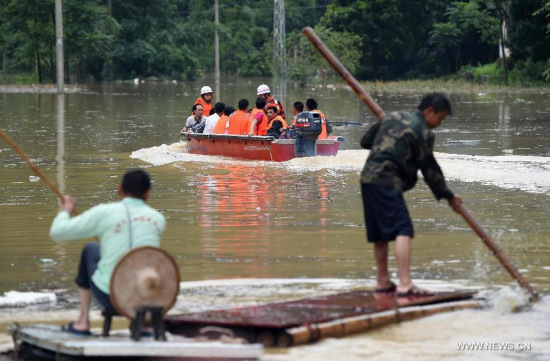
Rescuers help evacuate local residents in Deli Village of Dahua Yao Autonomous County, south China's Guangxi Zhuang Autonomous Region, June 14, 2015. (Photo: Xinhua/Huang Xiaobang)
Elderly-care is in the spotlight this week after old people were left stranded by floods in south China, leaving at least one missing and dozens waiting hours to be rescued.
When the heaviest rain storm in six decades hit Dahua County, Guangxi Zhuang Autonomous Region, on Sunday afternoon, Lan Yunle, 67, and his elderly mother had to climb onto the roof of their two-story home.
"The rain came so suddenly," said Lan. "Within 20 minutes, our ground floor was inundated."
The mother and son had to wait 24 hours to be rescued.
"I had managed to grab a cooker and some rice, so I was able to prepare a simple meal," said Lan. "But we had no drinking water and it was impossible to get back into the house. I was really worried about my mother, who is over 90."
Dahua County recorded 390 millimeters of precipitation in the 24 hours from June 14 to 15. In lower areas, even rooms on the second floor were submerged to waist height.
In Lan's home village of Nongdai, 25 people were caught in the flood, all "empty-nesters" aged from 55 to 98. They were actually the only permanent residents in the village.
Roads into the village were impassable. Rescue efforts had to be conducted by boat, and rescuers had no choice but to carry the boats along mountain passes to access villages.
When they finally arrived at Lan's village at 1 p.m. Monday, the elderly villagers had been stranded for nearly 24 hours.
"We evacuated 60 people in Nongdai and its neighboring villages over the past two days," said Tu Tietuo, chief of Dahua County's military affairs department who led the rescue work. "Most were empty-nesters, some were disabled, while many others had chronic diseases."
Empty-nesters are the most vulnerable when natural disasters strike. One bed-ridden septuagenarian was swept away by flood waters on Sunday, and is still missing, Tu said.
"While most elderly villagers struggle with mobility issues, many old people just refuse to leave their ancestral homes," he said. "It's essential we provide adequate care for the elderly to keep them safe."
The Ministry of Civil Affairs believes more than half of Chinese households are seniors who live alone without children around. It estimates there will be more than 51 million empty-nesters by the end of this year.
The situation is particularly worrying in the countryside, as the younger generations leave for better-paid jobs in cities.
By the end of 2014, there were about 274 million migrant workers in China, one-fifth of the population.
















































